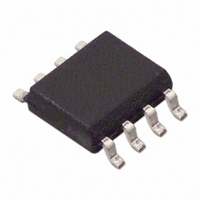AD8529AR Analog Devices Inc, AD8529AR Datasheet - Page 13

AD8529AR
Manufacturer Part Number
AD8529AR
Description
IC OPAMP GP R-R 8MHZ DUAL 8SOIC
Manufacturer
Analog Devices Inc
Datasheet
1.AD8519AKSZ-REEL7.pdf
(16 pages)
Specifications of AD8529AR
Rohs Status
RoHS non-compliant
Amplifier Type
General Purpose
Number Of Circuits
2
Output Type
Rail-to-Rail
Slew Rate
2.9 V/µs
Gain Bandwidth Product
8MHz
Current - Input Bias
300nA
Voltage - Input Offset
600µV
Current - Supply
600µA
Current - Output / Channel
25mA
Voltage - Supply, Single/dual (±)
2.7 V ~ 12 V, ±1.35 V ~ 6 V
Operating Temperature
-40°C ~ 125°C
Mounting Type
Surface Mount
Package / Case
8-SOIC (3.9mm Width)
-3db Bandwidth
-
Available stocks
Company
Part Number
Manufacturer
Quantity
Price
Part Number:
AD8529AR
Manufacturer:
ADI/亚德诺
Quantity:
20 000
Part Number:
AD8529ARM
Manufacturer:
ADI/亚德诺
Quantity:
20 000
Company:
Part Number:
AD8529ARM-REEL7
Manufacturer:
AD
Quantity:
5 510
Company:
Part Number:
AD8529ARM-REEL7
Manufacturer:
SSI
Quantity:
5 510
Part Number:
AD8529ARMZ
Manufacturer:
ADI/亚德诺
Quantity:
20 000
Part Number:
AD8529ARMZ-REEL7
Manufacturer:
ADI/亚德诺
Quantity:
20 000
Part Number:
AD8529ARZ
Manufacturer:
ADI/亚德诺
Quantity:
20 000
10× MICROPHONE PREAMP MEETS PC99
SPECIFICATIONS
This circuit, while lacking a unique topology, is anything but
featureless when an AD8519 is used as the op amp. This preamp
gives 20 dB gain over a frequency range of 20 Hz to 20 kHz and
is fully PC99 compliant in all parameters including THD + N,
dynamic range, frequency range, amplitude range, and crosstalk.
Not only does this preamp comply with the PC99 specifications,
it far surpasses them. In fact, when the input noise is 120 dB,
this preamp has a V
able for most professional 20-bit audio systems. At 120 dB THD
+ N in unity gain, the AD8519 is suitable for 24-bit professional
audio systems. In other words, the AD8519 will not be the
limiting performance factor in audio systems despite its small
size and low cost.
Slew rate related distortion is not present at the lower voltages
because the AD8519 is so fast at 2.1 V/μs. A general rule of
thumb for determining the necessary slew rate for an audio
system is to take the maximum output voltage range of the
device, given the design’s power rails, and divide by two. In
Figure 24, the power rails are 2.7 V and the output is rail-to-rail.
Enter these numbers into the equation: 2.7/2 = 1.35 V, and the
minimum ideal slew rate is 1.35 V/μs.
While this data sheet gives only one audio example, many audio
circuits are enhanced with the use of the AD8519. Examples
include: active audio filters such as bass, treble, and equalizers;
PWM filters at the output of audio DACs; buffers and summers
for mixing stations; and gain stages for volume control.
MIC
IN
1kΩ
2.7V
1nF
NPO
1µF
C1
Figure 24. 10× Microphone Preamplifier
3.09kΩ
OUT
46.4kΩ
noise of around 100 dB, which is suit-
10µF ELECT
93.1kΩ
30.9kΩ
240pF
2.7V
AD8519
2.7V
CODEC LINE IN
OR MIC IN
48kΩ
Rev. D | Page 13 of 16
TWO-ELEMENT VARYING BRIDGE AMPLIFIER
There are a host of bridge configurations available to designers.
For a complete analysis, look at the ubiquitous bridge and its
different forms. Refer to the 1992 Amplifier Applications Guide
Figure 25 is a schematic of a two-element varying bridge. This
configuration is commonly found in pressure and flow transduc-
ers. With a two-element varying bridge, the signal is 2× as
compared to a single-element varying bridge. The advantages
of this type of bridge are gain setting range and single-supply
application. Negative characteristics are nonlinear operation
and required R matching. Given these sets of conditions,
requirements, and characteristics, the AD8519 can be successfully
used in this configuration because of its rail-to-rail output and
low offset. Perhaps the greatest benefits of the AD8519, when
used in the bridge configuration, are the advantages it can bring
when placed in a remote bridge sensor. For example, the tiny
SC70 and SOT-23 packages reduce the overall sensor size; low
power allows for remote powering via batteries or solar cells,
high output current drive to drive a long cable; and 2.7 V
operation for two-cell operation.
1
Adolfo Garcia and James Wong, Chapter 2, 1992, Amplifier Applications Guide.
Figure 25. Two-Element Varying Bridge Amplifier
R
R
2.7V
R
R
R
F
AD8519/AD8529
R
F
AD8519
1
.









